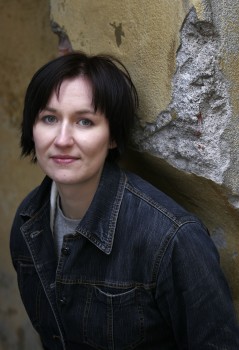Outside the human realm
28 May 2010 | Authors, Reviews

Tiina Raevaara. Photo: Heini Lehväslaiho
Themes enriched by the natural sciences set in a kind of naturalised literary fantasy make Tiina Raevaara an interesting young prose-writer. She is a doctor of genetics and a science writer whose collection of fourteen short stories, En tunne sinua vierelläni (‘I don’t feel you beside me’, Teos, 2010), is her second literary work.
Fantasy and a sombre dystopia combine in her debut novel, Eräänä päivänä tyhjä taivas (‘One day an empty sky’, 2008), which took its readers to the centre of ecological catastrophes and struggles for power taking the form of family relationships. The novel was seen as a morality tale examining the issue of human responsibility, and Leena Krohn, Johanna Sinisalo, Maarit Verronen and Jyrki Vainonen were identified as its literary godparents.
What unites these Finnish writers working at the borders of fact, fiction and fantasy? They are distinguished from realist prose by the way they pose a certain type of ethical question: the complex relationship between humankind and what is called nature, and the inexplicable fuzzy area between the two, which the hard sciences are unable to grasp. In these writers’ work, fantasy often layers into philosophical allegories which examine the limits of what can be experienced as human.
In her new collection of short stories, Raevaara (born 1979) succeeds in developing the thematic lines described above. This is important, because she always appears to be writing in order to say something serious. Short forms suit her concentrated style and the condensed atmosphere she strives for.
It is no wonder that her short story ‘Sääkset’ (‘Ospreys’) won the prestigious Martti Joenpolvi Prize. Here Raevaara’s strongly nature-centred understanding of life is revealed at its most uncompromising. At the edge of the osprey swamp everything is the same: ‘The bog grows on the surface and dies inside, at the same time, for thousands upon thousands of years.’ Her riddling description of the fate of a walker examining birds and their nesting habits in the motionless landscape of the swamp poses a spectacular challenge to the central role of man assumed by humanism.
The idea of juxtaposing perceptions and judgements of people and animals recurs in many short stories. Raevaara gives a point of view to animals, creatures and things that people fear, admire, consider strange. A certain Mr Gordon feels himself to be a stranger in the birds’ hospital: ‘I’ve never known a bird,’ he finds himself confessing to a black-throated diver. The short story develops into an allegory that personifies the entire bird kingdom; all that remains for man is the role of a disappearing part of nature.
Alongside nature and the animal kingdom, the hidden fears and traumas of the human mind, and the dregs that only come to the surface in dreams, are the area that Raevaara’s short stories examine. ‘Kaivo’ (‘The well’) is a depiction of a nightmarishly strange landscape that is revealed as a living painting. From it grows the force-field of a maternal woman who bears life and children who rise from the well. In the end the painting, which could be interpreted as the nightmare of every mother, fades and releases its grip on the viewer.
The world of the short story ‘Luojani, luomani’ is similarly strongly gendered. Its narrator is an artifical female intelligence, who is always switched off at night, a kind of gynoid whose self resides within a hard case. The man is her creator and her owner, and men rule the technical world which the literate machine dazzles with her achievements. But for the man she is merely a saleable, unfeeling object, devoid of any tangible selfhood.
This story, lent wings by its quotations from Dante’s Divina Commedia, remains intriguingly open at the end, as Raevaara’s short stories generally do. Their atmospheres are a call to empathy, so strongly do they depict the power of the unconscious to give voice to that which has been silenced.
Translated by Hildi Hawkins
Tags: fantasy, Finnish Weird, science fiction, short story
No comments for this entry yet
Trackbacks/Pingbacks:
Leave a comment
Also by Mervi Kantokorpi
Finding a voice - 13 November 2014
In the shadow of the cathedral - 6 November 2014
Updated, alive - 8 May 2014
Human destinies - 7 February 2014
Writing silence - 6 June 2013
-
About the writer
Mervi Kantokorpi is a literary scholar and critic and reviews books for, among other publications, the newspaper Helsingin Sanomat.
© Writers and translators. Anyone wishing to make use of material published on this website should apply to the Editors.

7 February 2011 on 3:12 pm
[…] a doctorate in genetics. Her fiction is described as “naturalised literary fantasy” in this article from the online magazine, Books from Finland. The article also compares Tiina to Leena Krohn and […]
13 May 2011 on 7:41 pm
[…] every year. And some of them even win awards like Tiina Raevaara's fabulous short story collection "En tunne sinua vierelläni" that just won the prestigious […]
3 May 2013 on 4:52 pm
[…] In the journal Books from Finland, Mervi Kantokorpi posits that “the hidden fears and traumas of the human mind, and the dregs that only come to the surface in dreams, are the area that Raevaara’s short stories examine.” In the specific case of “My Creator, My Creation,” a story Kantokorpi calls “strongly gendered,” Raevaara’s concern is the power dynamics and potential for individuation in male/female relationships. “Its narrator is an artifical female intelligence,” Kantokorpi writes, “who is always switched off at night, a kind of gynoid whose self resides within a hard case. The man is her creator and her owner, and men rule the technical world which the literate machine dazzles with her achievements. But for the man she is merely a saleable, unfeeling object, devoid of any tangible selfhood.” […]